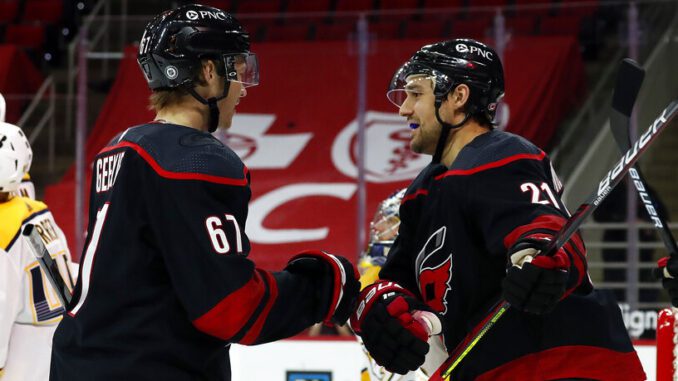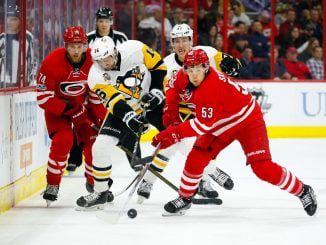
The Carolina Hurricanes’ 21-7-3 record has them near the top of the NHL standings. Their power play has them in even better company.
Despite going 0 for 2 in each of the last two games, Carolina’s power play sits atop the league at 30.6% and is on par with some of the more high-powered attacks of all-time.
If the Hurricanes maintain their current pace, only the 1977-78 Montreal Canadiens (31.9%), and 1977-78 (31.4%) and 1978-79 (31.2%) New York Islanders would have better marks — teams that were a combined 158-42-40 and represented the transition from Montreal’s 1970s dominance into the start of the Islanders’ dynasty.
A good power play was important then, and it might be even more important now.
“It’s the game now,” Hurricanes coach Rod Brind’Amour said. “You’ve gotta have good special teams, for sure.”
While Carolina’s penalty kill ranks a serviceable ninth at 82.9%, it’s the power play that’s helped carry the Hurricanes to success this season.
The Carolina power play has scored at least once in 21 of the team’s 31 games, including getting multiple goals seven times. In the 20 games in which the Hurricanes get at least three opportunities, they’ve scored in 17.
Much of that success can be attributed to the continuity of the Hurricanes’ roster, the familiarity of the players and the fact that both units have been equally effective.
“It’s probably playing with each other for a few years,” said Jordan Martinook, who has faced his own team’s power play frequently in practice in recent years. “And especially this year, the groups haven’t really changed that much. … But I think the best part about our power play this year is the second power play group is probably just as dangerous as the first one and they’re pushing them. … Just to see the evolution of our two units, it’s been fun to watch.”
There’s also been a next-man-up mentality when injures and illnesses have held players out of the lineup.
Newcomer Jesper Fast and defensive stalwart Brett Pesce have filled in due to injuries. The loss of Teuvo Teravainen (45 power play points the previous two seasons) to a concussion and the recent injury to Vincent Trocheck (tied for the team lead with 13 power play points, including a team-high six goals with the man advantage) also opened the door for Martin Necas and Jordan Staal to have bigger roles, and Jake Bean’s potential has been realized as he quarterbacks the second unit in place of the injured Jake Gardiner.
And with each goal comes more fuel for Carolina’s success.
“Confidence helps,” Sebastian Aho, the team’s leading scorer with 30 points, said. “When you see a couple pucks go in and then you start feeling it, instead of forcing plays you sometimes take an extra second to make a play.”
And when Aho and the first unit — which includes defenseman Dougie Hamilton and his 13 power play assists — can’t get it done, the Hurricanes’ second group has proven just as capable, even when Brind’Amour has needed to insert rookies like Bean and Morgan Geekie.
“It’s more just the fact that now we have better players,” Brind’Amour said, “and we’ve got two of our top guys out of the power play right now and still managed to keep it rolling.”
Still, the power play can be a fickle thing, and even Carolina’s 2006 Cup-winning team was, at a 15% conversion rate, 2.5% below the league average in the regular season before converting in 17 of 25 playoff games at a 24% clip.
Carolina’s confidence grew throughout that postseason, and the Hurricanes didn’t go two consecutive games without a power play goal during their run.
The end result? The franchise’s only Stanley Cup title.
The Hurricanes are again considered contenders for hockey’s ultimate prize, and Carolina’s special teams — particularly its power play — will be a key to the team’s success.
“I’ve realized that special teams is just such an important part of the game,” Pesce said, “and, honestly, I think on most nights it’s the difference.”



